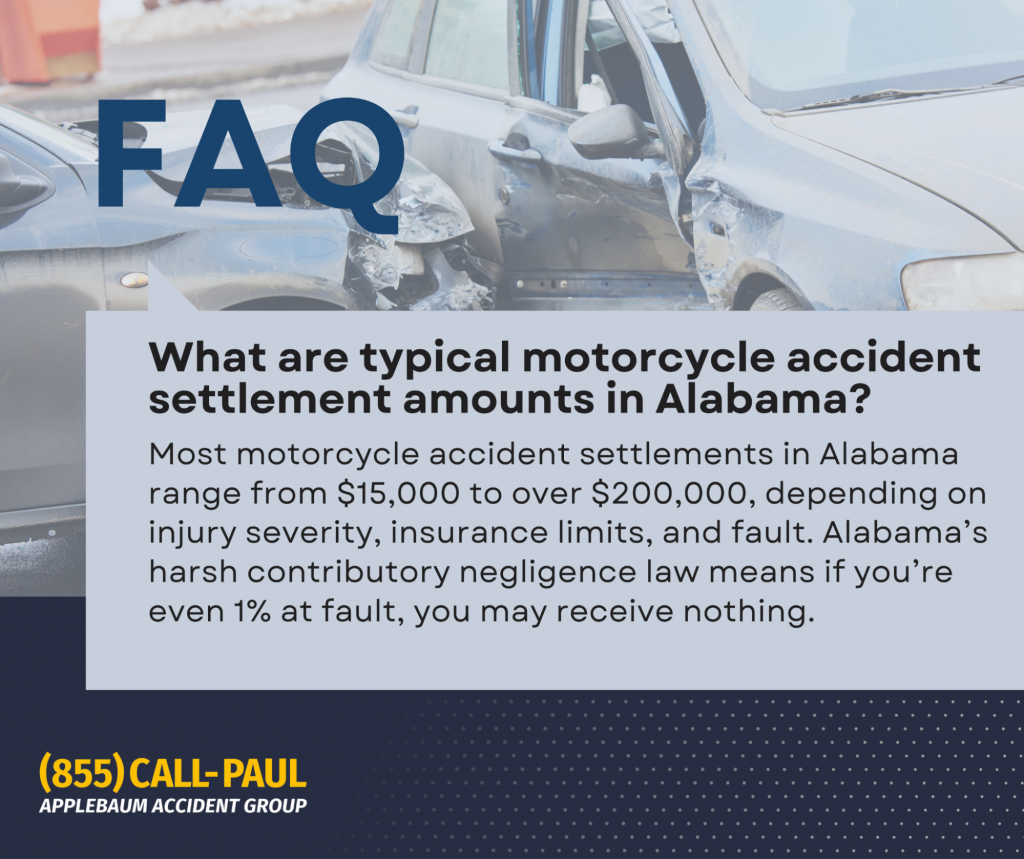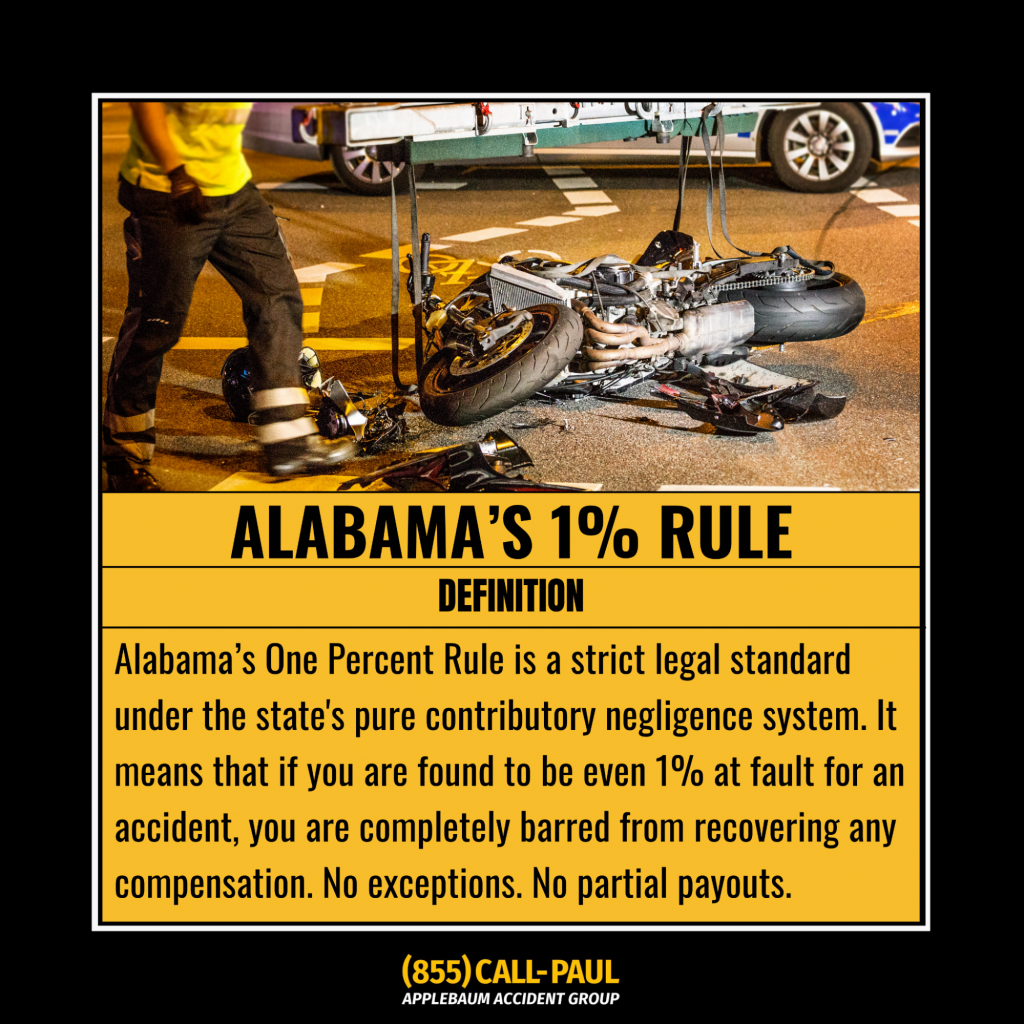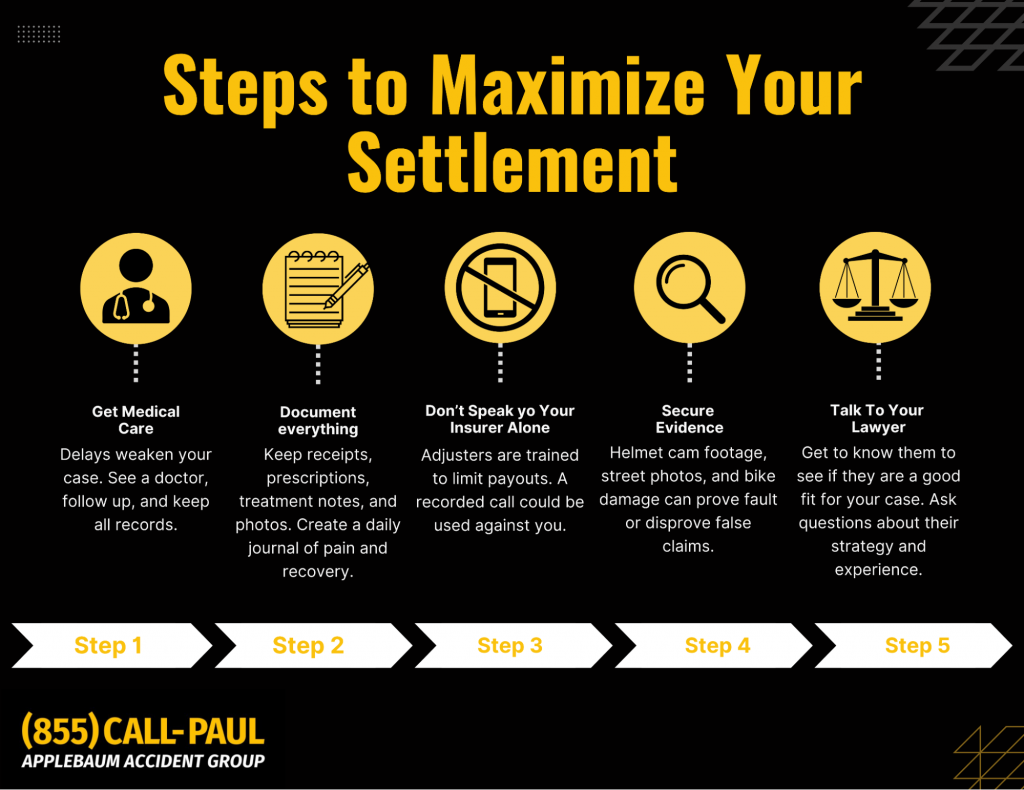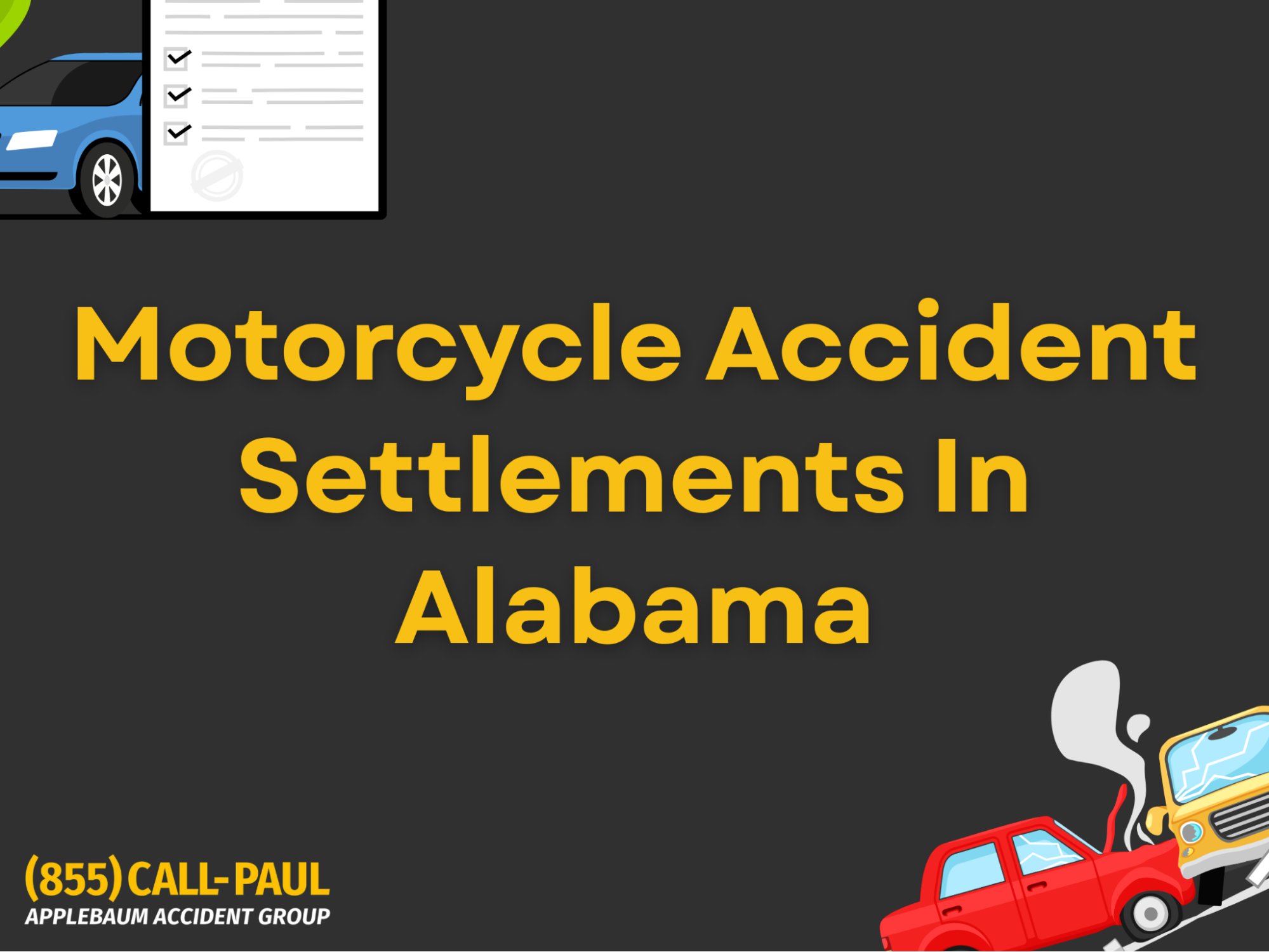Most motorcycle accident settlements in Alabama range from $15,000 to over $200,000, depending on injury severity, insurance limits, and fault. Alabama’s harsh contributory negligence law means if you’re even 1% at fault, you may receive nothing.

How much your case is worth depends on your injuries, fault, and the at-fault driver’s insurance. And in Alabama, one critical factor, contributory negligence, could mean walking away with zero. The Applebaum Accident Group network of legal professionals understands Alabama law and how to navigate around fault traps, lowball tactics, and policy limits.
In this guide, you’ll learn exactly how settlements are calculated, what insurance companies don’t tell you, and how to protect yourself from lowball offers and legal traps.
Alabama’s Motorcycle Accident Settlement Landscape
Motorcycle accident settlements in Alabama often range from $15,000 to over $200,000, depending on several key factors. What really moves the needle is how badly you were hurt and whether you’re being blamed for the crash.
Here’s what shapes the final number:
- Injury Severity: A fractured wrist will never be valued like a spinal injury or traumatic brain damage. The more serious and lasting your injuries, the higher the potential payout.
- Permanent Disability: If you’re unable to return to work, need assistance for daily tasks, or face long-term mobility issues, your case value goes up, sometimes dramatically.
- Pain and Suffering: Physical pain, mental trauma, PTSD, and lifestyle disruption matter. These are real losses that deserve compensation, even if they’re harder to quantify.
- Lost Wages and Earning Capacity: Settlements should cover both the time you missed work and your future earning potential, especially if your job was physically demanding.
- Medical Bills and Future Care: All expenses related to treatment, surgeries, therapy, and long-term care must be included. In many cases, this is the largest slice of the settlement.
- Policy Limits: Here’s where it gets tricky. If the driver who hit you has a $25,000 policy, that might be all you get, even if your bills are ten times that. That’s why underinsured motorist coverage (UIMBI) can be your safety net.
The 1% Rule, Why Fault Is Everything in Alabama

Alabama is one of only a few states with a pure contributory negligence rule. That means if you’re even 1% at fault, you’re not legally entitled to a dime. No split fault. No reduced payout. Just zero.
Here’s how riders get caught off guard:
- Helmet Not Worn: Even if helmets aren’t legally required in every situation, insurers may argue your injuries wouldn’t have been as bad, putting partial blame on you.
- No Protective Gear: They may claim your lack of riding gear “contributed” to road rash or lacerations, even if the other driver caused the crash.
- Minor Traffic Mistakes: Things like speeding 5 mph over the limit or missing a turn signal might be used to shift a sliver of blame onto you, just enough to destroy your claim.
So how do you protect yourself?
- Document everything at the scene: photos, witness names, road conditions.
- Get legal guidance early, especially before making any recorded statements to insurers.
- Push back against assumptions that bikers are reckless or “probably speeding.”
Can you still recover if you accept partial fault at the scene?
Not in Alabama. Saying “I should’ve seen them” or “I might’ve been a little fast” could kill your claim. Always speak with an attorney before admitting anything.
How Much Should You Ask for in a Settlement?
There’s no magic number, but there is a method. Most personal injury attorneys estimate your case value using medical expenses multiplied by a factor, typically 1.5 to 5, depending on pain, recovery time, and long-term impact.
What’s included in the ask:
- Medical bills
- Ongoing rehab and prescriptions
- Lost wages and job changes
- Permanent disability or disfigurement
- Emotional trauma
Here are some examples based on actual case structures:
- Broken arm, 3 months off work: $25,000–$40,000
- Back surgery, job loss: $120,000+
- TBI or paralysis: $250,000–$1,000,000+
Don’t overlook fear, anxiety, or PTSD, especially if you’re afraid to ride again. These losses deserve compensation. In fact, trauma-related impacts are often undervalued or not factored in at all.
The Real Cost of Settling Too Early
For many riders, the biggest mistake isn’t the crash, it’s settling too soon. When bills pile up and recovery is slow, it’s tempting to accept whatever the insurance company offers. But that decision can leave you with lasting regret. That’s why:
- Pressure from family and finances: When you can’t work, every dollar matters. But that urgency makes you vulnerable to fast cash tactics.
- Ghosting and frustration tactics: Insurance adjusters may suddenly stop returning your calls or drag out requests just long enough to make you cave.
- Your lawyer may not push back: If your attorney doesn’t prepare for trial or challenge the insurer’s narrative, you may be advised to take a weak offer.
Steps to Maximize Your Settlement (Even If You’re Struggling)

If you’ve been injured, waiting can cost you everything. Following these steps gives you leverage, even if you’re still recovering:
- Get medical care immediately: Delays weaken your case. See a doctor, follow up, and keep all records.
- Document everything: Keep receipts, prescriptions, treatment notes, and photos. Create a daily journal of pain and recovery.
- Never speak to insurance alone: Adjusters are trained to limit payouts. A recorded call could be used against you.
- Use visual evidence: Helmet cam footage, street photos, and bike damage can prove fault or disprove false claims.
- Ask your lawyer questions
- “What’s your strategy for my case?”
- “Have you taken a case like this to trial?”
- “Do you settle early, or do you push back when it matters?”
These aren’t rude questions, they’re protective ones.
Questions You Should Be Asking (But Probably Aren’t)
The most dangerous part of a motorcycle claim is what you don’t know to ask. These questions can make or break your outcome:
- Will my mental health history hurt my case?
Answer: It can, if insurers twist it. But a skilled attorney will use medical context to protect you. - Can I get more if I sue, or is trial too risky?
Answer: Trial isn’t for every case, but if you have strong facts and the right lawyer, it can double your payout. - How soon will I get paid after settlement?
Answer: Usually within 30–60 days. But unresolved liens or unclear paperwork can delay that timeline. - Does my criminal history matter?
Answer: It might. Jurors sometimes view past mistakes as credibility issues. An experienced lawyer will prepare for this. - How do I find out the at-fault driver’s policy limit?
Answer: You or your lawyer can request it in writing. Some insurers disclose this; others only do so after a formal demand.
Protecting Yourself From Common Pitfalls
Most injured riders don’t lose because they did something wrong, they lose because someone used the system against them.
What insurers do:
- Delay contact or “ghost” you
- Offer fast cash before full recovery
- Twist your statements into admissions of fault
What bad lawyers do:
- Don’t explain fees or costs clearly
- Avoid trial preparation to cut their own risk
- Push you to settle, even when you don’t want to
If you feel rushed, ignored, or misled, you can switch attorneys. It’s your case, and your future.
What to Do Right Now
Alabama doesn’t play fair with motorcycle accident victims. The law is strict. The insurers are aggressive. And time is not on your side.
You only get one shot at this.
Why Riders Trust Applebaum Accident Group

If you’ve been hurt in a motorcycle crash, you’re probably overwhelmed, in pain, and unsure who to trust. That’s exactly why we built Applebaum Accident Group, to match injured riders with attorneys who:
- Know Alabama’s laws inside and out
- Don’t back down when insurance companies try to shift blame
- Work with medical professionals to help build your case
We’ve seen too many riders get lowballed because no one took their injuries seriously.
At Applebaum Accident Group, we match, connecting you with attorneys who fight, and medical teams who understand motorcycle trauma inside and out.
Don’t wait. Don’t settle short.





